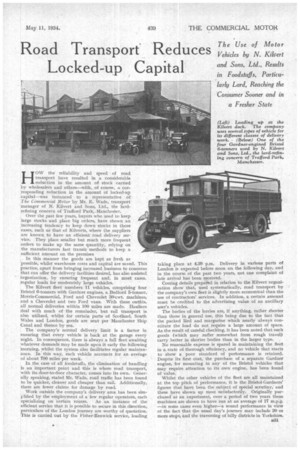Road Transport Reduces Locked-up Capital
Page 49

If you've noticed an error in this article please click here to report it so we can fix it.
The Use of Motor Vehicles by N. Kilvert and Sons, Ltd., Results in Foodstuffs, Particularly Lard, Reaching the Consumer Sooner and in a Fresher State
HOW the reliability and speed of road transport have resulted in a considerable reduction in the amount of stock carried by wholesalers and others—with, of course, a corresponding reduction in the amount of locked-up capital—was instanced to a representative of The Commercial Motor by Mr. E. Wade, transport manager of N. Kilvert and Sons. Ltd., the lardrefining concern of Trafford Park, Manchester.
Over the past few years, 'buyers who used to keep large stocks and place big orders, have shown an increasing tendency to keep down stocks in those cases, such as that of Kilverts, where the suppliers are known to have an efficient road delivery service. They place smaller but much more frequent orders to make up the same quantity, relying on the manufacturers fast transit methods to keep a sufficient amount on the premises
In this manner the goods are kept as fresh as possible, whilst warehouse costs and capital are saved. This practice, apart from bringing increased business to concerns that can offer the delivery facilities desired, has also assisted Organization, by ensuring frequent and, in most cases, regular loads for moderately large vehicles.
The Kilvert fleet numbers 11 vehicles, comprising four Bristol 0-tormers with Gardner engines, a Bedford 5-tonner, Morris-Commercial, Ford and Chevrolet 30-cwt. machines, and a Chevrolet arid two Ford vans, With these. outfits, all normal deliveries within 100 miles are made. Hauliers deal with much of the remainder, but rail transport is also utilized, whilst for certain parts of Scotland, South Wales and London, goods are sent per Manchester Ship Canal and thence by sea.
The company's normal delivery limit is a factor in ensuring that every vehicle is back at the garage every night. In consequence, there is always a full fleet awaiting whatever demands may be made upcn it early the following morning, ;whilst the system also facilitates regular maintenance. In this way, each vehicle accounts for an average of about 700 miles per week.
In the case of all foodstuffs, the elimination of handling is an important point and this is where road transport, with its, door-to-door character, comes into its own. Generally speaking, stated Mr. Wade, road traffic has been found to be quicker, cleaner and cheaper than rail. Additionally, there are fewer claims for damage by road.
Work outside the company's delivery area has been simplified by the employment of a few regular operators, each specializing on 'certain routes. As an instance of the efficient service that it is possible to secure in this direction, particulars of the London journey are worthy of quotation. This is carried out by the Fisher-Renwick service, loading
taking place at 4.30 p.m. Delivery in various parts of London is expected before noon on the following day, and in the course of the past two years, not one complaint of late arrival has been received.
Costing details prepared in relation to the Kilvert organization show that, used systematically, road transport by the company's own fleet is slightly more economical than the use of contractors' services. In addition, a certain amount must he credited to the advertising value of an ancillary user's vehicles.
The bodies of the lorries are, if anything, rather shorter than those in general use, this being due to the fact that the packed lard and margarine which nearly always constitute the load do not require a large amount of space. As the result of careful checking, it has been noted that such goods (which may suffer somewhat from rough travel) carry better in shorter bodies than in the larger type. No reasonable expense is spared in maintaining the fleet in a, state of thorough efficiency, and no vehicle that starts to show a poor standard of performance is retained. Despite its first cost, the purchase of a separate Gardner engine, for mounting in any of the Bristol vehicles that may require attention to its own engine, has been found of value.
Whilst the other vehicles of the fleet are all maintained at the top pitch of performance, it is the Bristol-Gardners' figures that have been the subject of special scrutiny,. and these have shown up most satisfactorily. Originally purchased as an experiment, over a period of two years these machines are shown to have run at an average of 17 m.p.g. —in some cases even higher—a sound performance in view of the fact that the usual day's journey may include 20 Or more stops, and the traversing of hilly districts in Yorkshire.




































































































